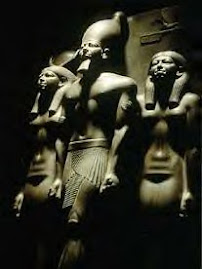Shem Hotep ("I go in peace").
Black Boy’s Blue Eyes Show Lesion
The boy in the pictures is probably one of the most striking examples of a black person with blue eyes. I believe his name is Laren Galloway and I do not announce his identity lightly. While it is interesting to see how the lad is growing up, this is not what caught my interest. Rather, what jumped out at me instantly was that he has some form of growing lesion on the inside of his left eye, specifically in the area of his iris. This lesion needs to be examined medically ASAP, (of course I leave room that his parents are already on top of it).
Eye lesions are usually benign (non-cancerous) and remain so, but this is not always true, nor does it mean that they should ever be ignored. What is really key is that they are kept under routine watch by a medically qualified eye specialist. What that person will watch for are changes in shape and size, as indications of brewing problems. Laren’s lesion, barely visible in the first picture, has clearly increased in size, as he has aged.
I have no contact with his family to voice my concern. I do recall that he might live in Louisiana. If you know this boy’s family or parents, please contact them and express the concern I present here. His eye sight and greater health/well-being are at risk without proper medical care. If you know this boy, but do not feel comfortable approaching his parents, you may send me contact information and I will contact them. Thanks (in advance) for helping to make sure this boy is being cared for.
Syndrome Gives Blacks Blue Eyes
A recent commenter on this blog suggested that the blue-eyed Black boy, in an earlier post, may present Waardenburg Syndrome, a rare autosomal genetic disorder that has possible bright blue eyes as one of its qualifying criteria, along with possible deafness (common). Actually, the cause of the blue eyes is a form of albinism that may include patches of non-pigmented skin or forehead hair, regardless of ethnicity.
There are four types of Waardenburg Syndrome, with a mix of possible characteristics as the determinant. Medical challenges increase with type. The boy in the picture is displaying two major symptoms of type 1, as does the previous boy (perhaps) (here); bright blue eyes and dystopia canthorum, a condition where the inner corners of the eyes are set more widely apart, but with normally distanced eyes.
Waardenburg occurs once in every 42,000 births, and is a deficiency inherited from a single parent, who may or may not display similar characteristics. Regarding the eye, color abnormalities come in three forms; heterochromia (multiple colors), bilateral isohypochromia (pale blue eyes), or fundus (reflective) pigmentary alterations (spottiness).
So, besides naturally occurring genetic blue eyes in dark skinned people, as previously discussed, understanding Waardenburg's is another avenue of accurately recognizing phenotype (gene expression) in eye color.
Robyn Why do I love you?
You have to walk carefully in the beginning of love; the running across fields into your lover's arms can only come later when you're sure they won't laugh if you trip. A hundred hearts would be too few
To carry all my love for you. The most important things are the hardest to say, because words diminish them. If love is blind, why is lingerie so popular? Love is only a dirty trick played on us to achieve continuation of the species. Love does not consist of gazing at each other, but in looking together in the same direction. It is astonishing how little one feels alone when one loves.












No comments:
Post a Comment